
Lionel Walter Rothschild, 2nd Baron Rothschild, Baron de Rothschild, was a British banker, politician, zoologist and soldier, who was a member of the Rothschild family. As a Zionist leader, he was presented with the Balfour Declaration, which pledged British support for a Jewish national home in Mandatory Palestine. Rothschild was the president of the Board of Deputies of British Jews from 1925 to 1926.

Polyura athamas, the common nawab, is a species of fast-flying canopy butterfly found in tropical Asia. It belongs to the Charaxinae in the brush-footed butterfly family (Nymphalidae).

Polyura delphis, the jewelled nawab, is a butterfly found in India and Southeast Asia that belongs to the rajahs and nawabs group, that is, the Charaxinae subfamily of the brush-footed butterflies family. The front wings have a concave outer edge and hind wings bear two tails.The upperside is white, largely marked with brown at the apex of the forewings. The reverse is metallic white decorated with yellow chevron lines and red marks. The wingspan is about 2.75 inches (70 mm).

Polyura dolon, the stately nawab or stately rajah, is a butterfly found in the Indomalayan realm belonging to the rajahs and nawabs group, that is, the Charaxinae group of the brush-footed butterflies family.1983

Papilio aegeus, the orchard swallowtail butterfly or large citrus butterfly is a species of butterfly from the family Papilionidae, that is found in eastern Australia and Papua New Guinea.

The rajah and pasha butterflies, also known as emperors in Africa and Australia, make up the huge type genus of the brush-footed butterfly subfamily Charaxinae, or leafwing butterflies. They belong to the tribe Charaxini, which also includes the nawab butterflies (Polyura). Charaxes are tropical Old World butterflies, with by far the highest diversity in sub-Saharan Africa, a smaller number from South Asia to Melanesia and Australia, and a single species in Europe. They are generally strong flyers and very popular among butterfly collectors.

Polyura is a subgenus of butterflies also referred to as Nawab butterflies and belonging to the brush-footed butterfly subfamily Charaxinae, or leafwing butterflies. Like the large and conspicuous forest queens, they belong to the genus Charaxes, unique genus of the tribe Charaxini.
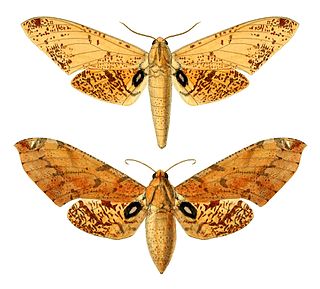
Platysphinx is a genus of moths in the family Sphingidae first described by Walter Rothschild and Karl Jordan in 1903.
Philodila is a genus of moths in the family Sphingidae first described by Walter Rothschild and Karl Jordan in 1903. Its only species, Philodila astyanor, described by Jean Baptiste Boisduval in 1875, is known from the Society Islands in the South Pacific Ocean.
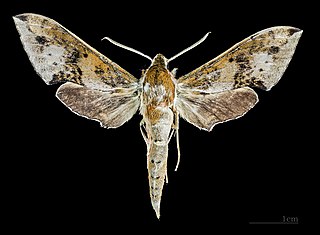
Rhagastis is a genus of moths in the family Sphingidae first described by Walter Rothschild and Karl Jordan in 1903.

Papilio sosia, the medium green-banded swallowtail, is a butterfly of the family Papilionidae. It is found in the Afrotropical realm. The species was first described by Walter Rothschild in 1903.
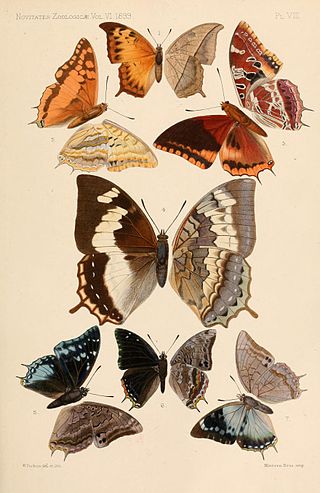
Charaxes boueti, the bamboo charaxes, is a butterfly in the family Nymphalidae. It is found in Senegal, Gambia, Guinea-Bissau, Guinea, Burkina Faso, Sierra Leone, Liberia, Ivory Coast, Ghana, Togo, Nigeria, Cameroon, Bioko, Gabon, the Republic of the Congo, the Central African Republic, Angola, the Democratic Republic of the Congo, Sudan, Ethiopia and Uganda. The habitat consists of forests, woodland and savanna.

Charaxes bipunctatus, the two-spot blue charaxes, is a butterfly in the family Nymphalidae. It is found in Ivory Coast, Ghana, Nigeria, Cameroon, Gabon, the Republic of the Congo, the Democratic Republic of the Congo, the Central African Republic, Uganda, Sudan, Kenya and Tanzania. A local and uncommon butterfly.
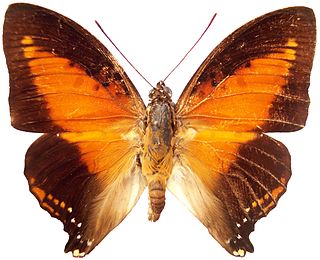
Charaxes zingha, the shining red charaxes, is a butterfly in the family Nymphalidae. It is found in Senegal, Guinea, Sierra Leone, Liberia, Ivory Coast, Ghana, Nigeria, Cameroon, the Republic of the Congo, Angola, the Central African Republic, the northern part of the Democratic Republic of the Congo, Uganda and western Tanzania. The habitat consists of lowland evergreen forests and sometimes gallery forests and coastal scrubland.

Charaxes blanda is a butterfly in the family Nymphalidae. It is found in Kenya and Tanzania.

Milionia elegans is a species of moth in the family Geometridae first described by Karl Jordan and Walter Rothschild in 1895. It is found on Fergusson Island in Papua New Guinea.

Polyura andrewsi is a butterfly in the family Nymphalidae. It was described by Arthur Gardiner Butler in 1900. It is endemic to Christmas Island in the Indian Ocean.

Charaxes (Polyura) caphontis is a butterfly in the family Nymphalidae. It was described by William Chapman Hewitson in 1863. It is endemic to Fiji. The only species of the genus [Eriboea (Polyura pars]with a reddish-brown double-row on the upper surface of the hindwings. The under surface of the male is dark chestnut brown, of the female greyish-brown. The markings of the upper surface are repeated, except the greenish band of the hindwings, which, moreover, in the female consists only of a thin line on the upper surface. Flying time according to Woodford in November, the rainy period, in the Fidji Islands. According to Rothschild and Jordan there are also males with a yellowish median band being distinctly pronounced also on the under surface of the hindwing

Charaxes (Polyura) epigenes is a butterfly in the family Nymphalidae. It was described by Frederick DuCane Godman and Osbert Salvin in 1888. It is endemic to the Solomon Islands.
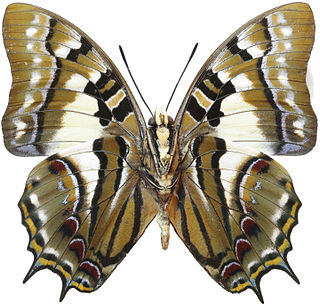
Charaxes (Polyura) pyrrhus is a butterfly in the family Nymphalidae. It was described by Carl Linnaeus in his 1758 10th edition of Systema Naturae. It is found in the Australasian realm including New Guinea, Australia, Timor, Moluccas.



















